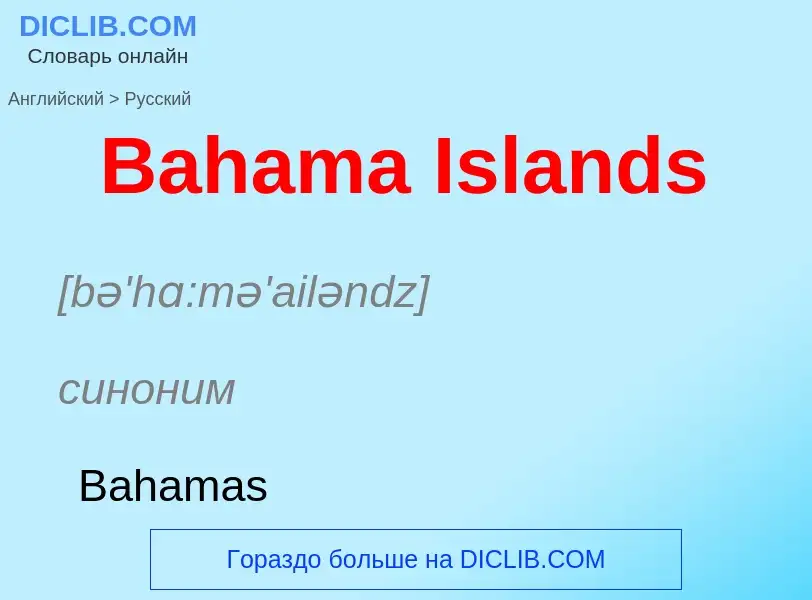Перевод и анализ слов искусственным интеллектом ChatGPT
На этой странице Вы можете получить подробный анализ слова или словосочетания, произведенный с помощью лучшей на сегодняшний день технологии искусственного интеллекта:
- как употребляется слово
- частота употребления
- используется оно чаще в устной или письменной речи
- варианты перевода слова
- примеры употребления (несколько фраз с переводом)
- этимология
Bahama Islands - перевод на русский
[bə'hɑ:mə'ailəndz]
синоним
существительное
общая лексика
Багамские острова
Определение
Википедия
The Bahamas ( (listen)), officially the Commonwealth of The Bahamas, is an island country within the Lucayan Archipelago of the West Indies in the North Atlantic. It takes up 97% of the Lucayan Archipelago's land area and is home to 88% of the archipelago's population. The archipelagic state consists of more than 3,000 islands, cays, and islets in the Atlantic Ocean, and is located north of Cuba and northwest of the island of Hispaniola (split between the Dominican Republic and Haiti) and the Turks and Caicos Islands, southeast of the U.S. state of Florida, and east of the Florida Keys. The capital is Nassau on the island of New Providence. The Royal Bahamas Defence Force describes The Bahamas' territory as encompassing 470,000 km2 (180,000 sq mi) of ocean space.
The Bahama Islands were inhabited by the Lucayans, a branch of the Arawakan-speaking Taíno, for many centuries. Christopher Columbus was the first European to see the islands, making his first landfall in the "New World" in 1492 when he landed on the island of San Salvador. Later, the Spanish shipped the native Lucayans to and enslaved them on Hispaniola, after which the Bahama islands were mostly deserted from 1513 until 1648, nearly all native Bahamians having been forcibly removed for enslavement or having died of diseases that Europeans brought to the islands. In 1649, English colonists from Bermuda, known as the Eleutheran Adventurers, settled on the island of Eleuthera.
The Bahamas became a British crown colony in 1718, when the British clamped down on piracy. After the American Revolutionary War, the Crown resettled thousands of American Loyalists to the Bahamas; they took enslaved people with them and established plantations on land grants. Enslaved Africans and their descendants constituted the majority of the population from this period on. The slave trade was abolished by the British in 1807; slavery in the Bahamas was abolished in 1834. Subsequently, The Bahamas became a haven for freed African slaves. Africans liberated from illegal slave ships were resettled on the islands by the Royal Navy, while some North American slaves and Seminoles escaped to The Bahamas from Florida. Bahamians were even known to recognise the freedom of enslaved people carried by the ships of other nations which reached The Bahamas. Today Black-Bahamians make up 90% of the population of 400,516.
The country gained governmental independence in 1973, led by Sir Lynden O. Pindling. Charles III is currently its monarch. In terms of gross domestic product per capita, The Bahamas is one of the richest independent countries in the Americas (following the United States and Canada), with an economy based on tourism and offshore finance.

.png?width=200)
![[[White Bahamian]]s on the island of New Providence [[White Bahamian]]s on the island of New Providence](https://commons.wikimedia.org/wiki/Special:FilePath/Bahamas 1988 (644) New Providence Creative Learning Preschool, Nassau (25181400074).jpg?width=200)
![Nassau]] Nassau]]](https://commons.wikimedia.org/wiki/Special:FilePath/BahamianParliamentPanorama.jpg?width=200)
![[[Continental Marines]] land at [[New Providence]] during the [[Battle of Nassau]] in 1776 [[Continental Marines]] land at [[New Providence]] during the [[Battle of Nassau]] in 1776](https://commons.wikimedia.org/wiki/Special:FilePath/Battle of Nassau.jpg?width=200)
.png?width=200)
![Sign at [[Bill Baggs Cape Florida State Park]] commemorating hundreds of [[African-American]] slaves who escaped to freedom in the early 1820s in The Bahamas Sign at [[Bill Baggs Cape Florida State Park]] commemorating hundreds of [[African-American]] slaves who escaped to freedom in the early 1820s in The Bahamas](https://commons.wikimedia.org/wiki/Special:FilePath/Escaping To Freedom In The Bahamas sign 01.jpg?width=200)
![lighthouse]] in Great Isaac Cay. lighthouse]] in Great Isaac Cay.](https://commons.wikimedia.org/wiki/Special:FilePath/Great Isaac Cay, Bahamas.jpg?width=200)


![Nassau]] Nassau]]](https://commons.wikimedia.org/wiki/Special:FilePath/Junkanoo.jpg?width=200)

.jpg?width=200)

![Duke of Windsor]] and [[Governor of the Bahamas]] from 1940 to 1945 Duke of Windsor]] and [[Governor of the Bahamas]] from 1940 to 1945](https://commons.wikimedia.org/wiki/Special:FilePath/The Duke of Windsor (1945).jpg?width=200)
![Nassau]]. Nassau]].](https://commons.wikimedia.org/wiki/Special:FilePath/Tommy Robinson National Stadium.jpg?width=200)
![Philip Davis]] of The Bahamas at the Office of the Vice President in 2023. Philip Davis]] of The Bahamas at the Office of the Vice President in 2023.](https://commons.wikimedia.org/wiki/Special:FilePath/Vice President Harris met with Prime Minister Davis of The Bahamas at the VP Office in 2023.jpg?width=200)
